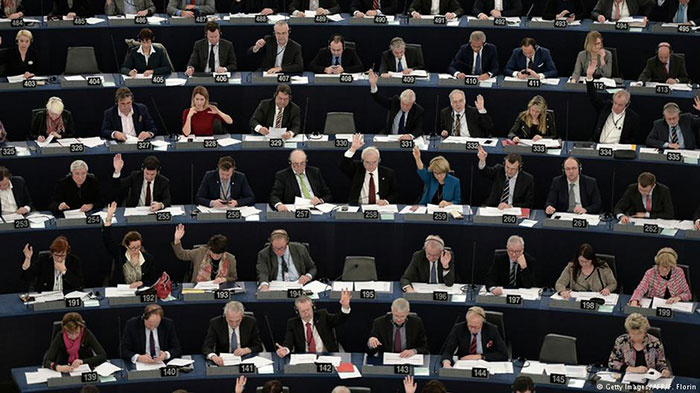Normalization of Ties between Iran and EU; How Normal Is It for Iran?

On Monday, the European Parliament passed a nonbinding resolution on new strategy toward Iran, which sets principles for normalization of EU relations with Iran following the nuclear deal.
The roadmap hails the nuclear deal as an achievement, welcomes economic cooperation with Iran, and recommends the opening of an EU embassy in Iran and a “confidence-building initiative on maritime security in the Persian Gulf,” among other measures.
In an interview with the European Parliament, Richard Howitt, member of the UK Socialists and Democrats group and the author of the report, lamented on the past three years where no engagement occurred between Iran and Europe. Stressing that not everything has improved, he hailed the nuclear deal and the election of more pro-reform politicians in Iran as a path towards improvement.
His draft had undergone a last-minute amendment, put forward by Dutch Liberal parliamentarian Marietje Schaake, that the house “[s]trongly condemns the Iranian regime’s repeated calls for the destruction of Israel and the regime’s policy of denying the Holocaust.”
However, the tone of the statement is much softer on Iran, particularly regarding its regional role and involvement in the fight against terrorism. Iran has officially welcomed the resolution, though cautiously. Iranian Foreign Ministry spokesman Bahram Ghassemi said this indicates positive will on the part of the European institute to broaden and deepen mutual ties in every respect.
“The report acknowledges the Islamic Republic’s effective regional and international role in establishing peace and stability in the region and emphasizes Iran’s constructive participation in solving regional disputes and fighting terrorism, particularly the ISIS and similar group. It also calls for expansion of ties in political, economic, energy, scientific, educational, research and environmental ties,” Ghassemi reiterated.
However, the resolution included paragraphs that sparked Iran’s criticism too. “Resolutions passed in the European Parliament have no enforcement guarantee but should reflect a realistic, constructive approach,” he said of the paragraphs that express concern over Iran’s human rights condition and its missile defense program.
Iran and EU will hold a second round of “high level dialogue” in November on political and human rights issues. Ghassemi noted that Iran considers dialogue as the right path for approximation of views and further cooperation between the sides.
A day before the EU parliament’s decision, Iranian Deputy Foreign Minister for European Affairs Majid Takht-Ravanchi said the high-level dialogue between Iran and Europe focuses on regional, political, economic, and environmental issues as well as human rights discussions, paving the way for gradual lifting of the human right sanctions imposed on Iran by the EU. Judiciary officials will accompany Iran’s diplomatic delegation to the talks.
Most Iranian observers have also met the report with caution and self-restraint. Iranian Daily Khorasan, which belongs to a cultural institute whose board of directors are appointed by the Supreme Leader’s bureau, criticized the report’s intervening, repetitive statements made about issues like death penalty, in an op-ed written by Amir-Hossein Yazdanpanah. Yazdanpanah meanwhile noted the report’s recognition of the Islamic Republic inherent capacities and achievements, highlighting long paragraphs that discuss Iran’s potential investment opportunities.
Putting the resolution’s positive paragraphs in a nutshell, the article notes its emphasis on “the great potential of developing renewable energies in Iran, a country with on average 300 days of sunshine per year, and an estimated production capacity equivalent to 13 times Iran’s total energy consumption”. Elsewhere in the report, Iran’s young and educated population is seen as an opportunity for “for advancing people-to-people contacts”, says the article.
To Yazdanpanah, however, the resolution is a reflection of how European public views Iran, as the Euro parliament members are elected through public vote. Writing on the economic ties stressed in the report, he says Iran should wait to see if the EU could overcome the obstacles, mainly US-imposed, for trade with Iran. “We should see if the Europeans are ready to stand against the US obstacles or not. The guarantee for the document passed will be EU’s behavior regarding Iran,” he concluded.
Veteran Iranian diplomats contacted for comment had differing views. Former Iranian ambassador to Italy, Abolfazl Zohrevand lambasts the resolution saying several paragraphs put forward “a third and fourth JCPOA”, referring to the historical nuclear deal between Iran and world powers. Speaking live on phone with Iranian state TV, he said the emphasis on the establishment of an EU Delegation in Tehran is because Europeans want to exert influence on human rights and domestic issues of Iran. The reason behind the new strategy, he said, is not the nuclear deal alone: Europeans are trapped in the region and now clearly understand they were the party that fostered the terrorists.
Iran’s Former Ambassador to Hungary and Norway Abdolreza Faraji-Rad told pro-reform Etemad Daily that the European Parliament plays a significant role in the European Union. Nonetheless, the political significance of the resolution is more than its legal importance he added. Whereas the dialogue between the sides came to a full stop when the reformist administration [under President Khatami] left office, “the resolution gives the green to the EU for normalization and even expansion of ties with Iran” according to Faraji-Rad. Speaking about the human rights, he said Iran has engaged in human rights negotiation with Europe in the past and it has not been counterproductive for the country.
The harshest response has come from the head of the Iranian Judiciary's Human Rights Council, Mohammad Javad Larijani who denounced the statement for what he called its “many flaws”, arguing that even in trade-related paragraph it only views Iran as a place to sell European commodities. He further lambasted the proposition to open a bureau in Tehran, saying Europeans seek close ties with local human rights advocates and NGOs. He said Iran’s judiciary would not let such a “den of corruption” to be established, implicitly comparing the prospective center to United States’ embassy in Tehran, shutdown early after the 1979 Islamic Revolution under suspicions of espionage and coup plot.

